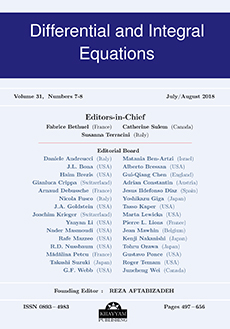Abstract
An annulus argument is a method of proof which can detect that a curve in $\mathbb{R}^n$ crosses an annulus around the origin infinitely many times. In this paper we give annulus arguments not requiring the boundedness of the derivatives of the functions involved. Using these results we establish Lyapunov type theorems for the attractivity, asymptotic stability, and partial stability properties of the zero solution of nonautonomous functional differential equations whose right hand sides are not bounded with respect to the time. We apply these results to the scalar equation $$ x'(t) = -c(t)x(t) + b(t)x(t-h)\qquad(c(t) \ge 0), $$ the scalar equation with several delays $$ x'(t) = -c(t)x(t) + \sum^n_{i=1} b_i(t)x(t - h_i)\qquad(c(t) \ge 0), $$ as well as to the system $$ x'(t) = B(t)x(t-h)-C(t)x(t), $$ where $B (t)$ and $C(t)$ are continuous matrix functions.
Citation
László Hatvani. "Annulus arguments in the stability theory for functional differential equations." Differential Integral Equations 10 (5) 975 - 1002, 1997. https://doi.org/10.57262/die/1367438629
Information





